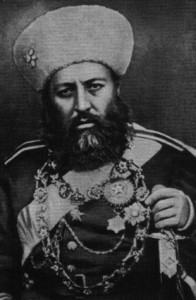Sir Thomas Acquin Martin – Industrial Pioneer (1850-1906)
Sir Thomas Acquin Martin and his wife Sarah have a really beautiful memorial, in the shape of an angel and a cross, in the Catholic Section of Ryde Cemetery.
Before moving to Ryde Sir Thomas spent much of his life abroad. He was an industrial pioneer in India and Agent-General in Afghanistan. He was born at Four Oaks, Sutton Coldfield, Birmingham on 6 March 1850, the son of Patrick William Martin, a leather manufacturer, and his wife Mary Ann Bridges.
Thomas was educated at the Oratory in Edgbaston and then entered the engineering firm of Walsh Lovett in Birmingham, in 1874 he was sent out to Calcutta in India to set up a branch for that company. He had exceptional business capacity and he soon founded a firm which bore his own name, Martin & Co. As head of his own company he was notable in the material development of India.
In 1889 his company took over the management of the Bengal Iron and Steel Company and improvements were made in the manufacturing process increasing the output of pig iron from 9000 tons to 75,000 per annum, enabling it to be competitive with imported steel and iron. The firm also pioneered the construction of light railways along the district roads in India which served as feeders to the main lines. Many jute mills were constructed by the company, three large collieries in Bengal and the Hooghly Docking and Engineering Company also came under its control.
The Tansa duct works, which provided Bombay with a constant supply of water from a lake some forty miles away, were engineered by Martin’s company which went on to carry out the water supplies to the suburbs of Calcutta and many other Indian towns and cities. Martin & Co built many palaces and important buildings throughout India, and in particular in Calcutta, where they were contractors for the All-India Victoria Memorial Hall.
(Image of Victoria Memorial Hall from
http://www.indialine.com/travel/westbengal/)
In 1887 Thomas Martin was appointed Agent by Abdur Rahman Khan, the Ameer of Afghanistan, and he sent Sir Thomas Salter Pyne to Kabul where he built, on behalf of Martin’s firm, an arsenal, a mint, various factories and workshops and introduced a number of modern industries as state monopolies.
(Image of Abdur Rahman Khan from
http://commons.wikimedia.org/wiki/Image:AbdurRahmanKhan-A.jpg)
Thomas Martin was consulted by the Ameer on questions of policy and he and his agents were able to render frequent political service to Great Britain. Abdur Rahman Khan selected Thomas to be Chief of Staff to Prince Nasrullah Khan, his second son, on his mission to England in 1895. The visit lasted from 24 May to 3 September and in August the Queen conferred the honour of a Knighthood on Thomas Acquin Martin in recognition of his work.
The Ameer’s main objective in arranging this visit had been the opening of direct diplomatic relations with Great Britain, although this was not achieved Abdur Rahman still retained the fullest confidence in Martin. On his return to Kabul, Nasrullah Khan was accompanied by Thomas’s younger brother Frank, who succeeded Pyne as Engineer-in-Chief.
Sir Thomas Martin was a kind and generous man. In 1889 he took the unusual step of bringing into the partnership of his company an able Bengali (Sir) R N Mukherji, who carried on running the company with Martin’s sons, Ernest and Harold, and Mr Walsh after Sir Thomas Martin died.
The years spent in the tropical climate of India took its toll on Sir Thomas’s health and he spent much of his later life in Europe. He died at the young age of 56 at Binstead House, Ryde, on 29 April 1906 leaving his wife, Sarah Ann, a daughter and five sons. He is buried in Ryde Cemetery.
Source: the Dictionary of National Biography edited by Sidney Lee date (unknown) www.googlebooks.com
Photograph of Sir T A Martin’s memorial by Rachael Mead
Sir Thomas Acquin Martin grave page



